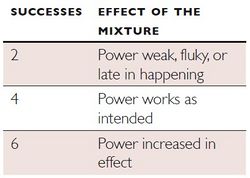Thin-Blood Alchemy: Difference between revisions
Jump to navigation Jump to searchmNo edit summary |
mNo edit summary |
||
| Line 280: | Line 280: | ||
When consumed, all Ashe allows a thin-blood to access more of the power in vitae and ash than is usually within their grasp. Their Blood Potency counts as 1 for the purposes of Blood Surges and Discipline Rouse Check re-rolls until the end of the chapter. The drug is far from lacking in downsides however, see Ashe Addiction (see p. 46). | When consumed, all Ashe allows a thin-blood to access more of the power in vitae and ash than is usually within their grasp. Their Blood Potency counts as 1 for the purposes of Blood Surges and Discipline Rouse Check re-rolls until the end of the chapter. The drug is far from lacking in downsides however, see Ashe Addiction (see p. 46). | ||
{| class="wikitable" | {| class="wikitable" | ||
| Line 287: | Line 288: | ||
| Every time a thin-blood takes Ashe, they suffer one Superficial Willpower damage and make a Rouse Check. If they take any Aggravated Willpower damage while experiencing the effects of Ashe, they must roll to resist a hunger frenzy (Difficulty 2) as they suddenly crave the vitae, experiences, and powers of other vampires. This frenzy is pointed at other Kindred. If the vampire ingests any vitae as a result of their frenzy, they recover a point of Aggravated Willpower damage but their Hunger rating increases by one. Addiction to Ashe can be a paralyzing circle of needing more and more blood to survive and Ashe to continue experiencing the buzz of power. | | Every time a thin-blood takes Ashe, they suffer one Superficial Willpower damage and make a Rouse Check. If they take any Aggravated Willpower damage while experiencing the effects of Ashe, they must roll to resist a hunger frenzy (Difficulty 2) as they suddenly crave the vitae, experiences, and powers of other vampires. This frenzy is pointed at other Kindred. If the vampire ingests any vitae as a result of their frenzy, they recover a point of Aggravated Willpower damage but their Hunger rating increases by one. Addiction to Ashe can be a paralyzing circle of needing more and more blood to survive and Ashe to continue experiencing the buzz of power. | ||
|} | |} | ||
<div style='text-align: right;'> | <div style='text-align: right;'> | ||
''<sub>Cults of the Blood Gods, pg. 45</sub>'' | ''<sub>Cults of the Blood Gods, pg. 45</sub>'' | ||
Revision as of 21:51, 8 October 2021
THIN-BLOOD ALCHEMY
Cooking | Homebrew | The Craft | Mash | Kineticism
The thin Blood of the latest generations holds barely any power of its own. But certain thin-bloods have learned to use it as a catalyst, awakening the latent power in everything from human trauma to gasoline. Born of the street drug scene and cocktail culture as much as it w as uncovered by instinct or in moldering medieval texts, thin-blood Alchemy may be the defining art of the next-millennium lick. By blending strongly resonant human blood, and sometimes other substances, with their own vitae, Alchemists can counterfeit a wide range of powers from other Disciplines – and some unique powers of their own. Rumors already abound of specific elixirs that grant the ability to walk in sunlight, commune with Antediluvians, or achieve Golconda. But for now, the street-level cookers have all they can do to stay out of the Court’s sight – plenty of elders consider Alchemy nothing but watered-down diablerie.
Alchemy can counterfeit some Blood Sorcery powers (those that affect the caster’s Blood), but not Rituals. The Storyteller can rule any other power off-limits to Alchemy if they worry about game balance or the plausibility of the fiction – and reverse themselves later if they wish, or hint at unique recipes developed in Switzerland or hidden in a Cairo library. The Discipline is young, and thin-bloods have hardly explored every possible working or tasted every possible cocktail.
CHARACTERISTICS
- Type: Alchemy
- Masquerade Threat:
Varies as widely as the powers it counterfeits and the method used.
- Blood Resonance:
Required for each formula and varies accordingly.
All formulae require vitae from the Alchemist and human blood of the correct Resonance (p. 226). The Resonant human blood can be stored in a blood bag, or in a Starbucks to-go cup for that matter. The specific amount needed depends on the degree of the donor’s Resonance and on the Storyteller’s whim.
In these rules, “power level” always refers to the level of Alchemy involved, not the level of the power counterfeited with the formula.
All formulae have a cost to distill, and then the cost to activate. The distillation cost reflects the fact that all formulae include the Alchemist’s own vitae: A single Rouse Check. Activation cost for a formula is the same as using the power normally: free, or some number of additional Rouse Checks.
Once activated, the Alchemist makes a distillation roll to determine how effective the particular mixture was. Each version of Alchemy builds a different dice pool for the distillation roll. The more successes, the more effective the mixture.
Some powers require their own dice rolls to take effect, or to measure the degree of success. The Alchemist makes those rolls where needed, substituting their rating in Thin-Blood Alchemy for the specific Discipline rating where relevant.
To learn a new formula requires research time, whether the Alchemist spends it poring through libraries or in meditation or on tasting expeditions or performing laboratory experimentation. Players should write down which formulae their character already knows, and any special ingredients it requires. A character receives a formula for free for each dot in Thin-Blood Alchemy and can purchase additional formulae with experience and experimentation.
LEVEL 1
FAR REACH
HAZE
PORTABLE SHADE
LEVEL 2
ENVELOP
LEVEL 3
DEFRACTIONATE
PROFANE HIEROS GAMOS
ON-DEMAND SUNBURN
CONCOCT ASHE
CHEMICALLY-INDUCED FLASHBACK
LEVEL 4
AIRBORNE MOMENTUM
DISCIPLINE CHANNELING
LEVEL 5

